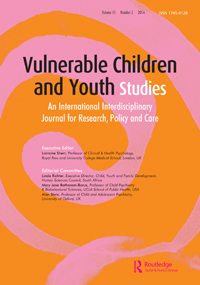 An art therapy intervention for symptoms of post-traumatic stress, depression and anxiety among Syrian refugee children
An art therapy intervention for symptoms of post-traumatic stress, depression and anxiety among Syrian refugee children
Vulnerable Children and Youth Studies: An International Interdisciplinary Journal for Research, Policy and Care
Volume 11, Issue 2, 2016
- DOI:
- 10.1080/17450128.2016.1181288
Nilay Ugurlua, Leyla Akcaa & Ceren Acarturkb*
pages 89-102
- Received: 17 Apr 2016
- Accepted: 18 Apr 2016
- Published online: 26 Apr 2016
ABSTRACT
This study first examined the prevalence of psychological symptoms among Syrian refugee children (N = 64) and assessed the effect of an art therapy intervention on post-traumatic stress, depression and anxiety symptoms. The Stressful Life Events (SLE) Questionnaire was used to measure stressful and traumatic experiences. The main outcome measures were UCLA Post-Traumatic Stress Disorder Parent version, Child Depression Inventory and State-Trait Anxiety Scale. After the baseline assessment, a five-day art therapy intervention, which is based on Skills for Psychological Recovery, was implemented. Findings of the study indicated that 60.3% (N = 35) of Syrian children who participated had high risk to develop post-traumatic stress disorder (PTSD) according to the SLE scale. The 23.4% of the children had PTSD symptoms while the 17.6% showed severe depression symptoms. Moreover, the 14.4% of the children showed severe levels of state anxiety symptoms and the 31.1% showed severe levels of trait anxiety symptoms. Findings of the study indicated that trauma, depression and trait anxiety symptoms of children were significantly reduced at the post-assessment. However, for state anxiety scores, significant differences between pre- and post-assessments did not appear. Therefore, it could be said that art therapy may be an effective method to reduce post-traumatic stress disorder, depression and trait anxiety symptoms among refugee children.
Pour lire l’article, cliquez sur la couv
